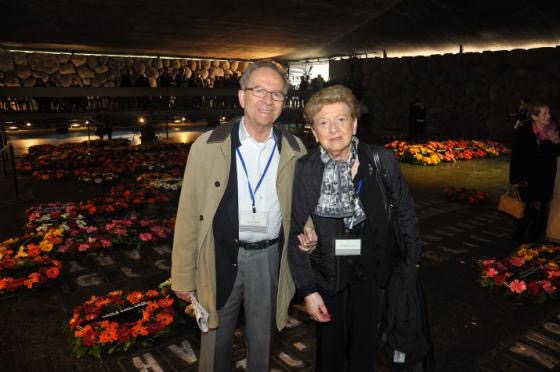 Georg and Elisabeth Citrom of the Holocaust Survivors Association, Sweden standing among the wreaths in the Hall of Remembrance.
Georg and Elisabeth Citrom of the Holocaust Survivors Association, Sweden standing among the wreaths in the Hall of Remembrance. Every generation has its own unique experiences; each new generation receives memory’s inheritance in its own way. We live in an increasingly mobile and global world, where just two generations can span continents, wars, economic hardship and success; migration and displacement; loss and growth and change. Our identity, which is both fixed and fluid, adapts and changes rapidly as we move physically, economically and socially; our chameleon instincts enable us to survive in new and changing environments.
Perhaps no group demonstrates the relationship between life lived and memory transferred more than the rapidly reducing number of Holocaust survivors, who every day pass the baton of memory to their families.
Georg Citrom was born in Romania in 1931. By the time he was just fourteen he had experienced life in the Oradea ghetto and had survived both Birkenau and Buchenwald – schooled, as some survivors say, in the hardest university of life. He could have been an angry and bitter man; after all, everyone he had grown up with, and all those he had loved, were turned to ashes during the Holocaust. But Georg chose a higher path. Dignified, hard-working and humble, he labored his way from teenage refugee to successful businessmen in his adopted Sweden. His wife Elisabeth, also a Holocaust survivor, raised their two children Evelyn and Joel in a Swedish culture devoid of Jewish influence, yet imbuing in them a keen sense of their Jewish identity. Evelyn settled in Israel where she still lives today. Joel settled in the United States, where, after graduating from the University of Southern California, he made a successful business career in New York. Joel’s wife Ulrika, also a daughter of a Holocaust survivor living in Sweden, raised three beautiful children with both Swedish and American citizenship, acutely aware of their deep connection to Israel and their European Jewish identity. They are a truly global family, just two generations on from the moment the Nazis intended to eradicate their lineage entirely.
I had several opportunities to spend time with Georg and Elisabeth Citrom, most recently in their home in Stockholm, where they married over sixty years ago. They bestowed me with affection as if I were a part of the family, and lavished homemade fare over a laden Shabbat table, as if I had not eaten for a week. I was enveloped by the warmth of their home and their deeply giving souls. As I left them and stepped into the chill night, I wondered how people who had experienced such darkness could become such shining beacons of humanity.
This week I was with Joel, Ulrika and family enjoying the Labor Day weekend, when news came through that Georg had suddenly and unexpectedly passed away. In the silence that ensued, I first felt that beacon flickering out, because for sure, no one can replace the man that was Georg Citrom. But then as I watched, I realized that his family are that light – they not only inherit his story, they are his story.
Should you walk into the reception of USC Shoah Foundation you will encounter a large life-sized photo of a Holocaust survivor surrounded by lights and cameras, documented while giving testimony. The man in the photo is Georg Citrom on the day he gave testimony in 2010. Over 55,000 survivors and witnesses have given testimony to the Visual History Archive, but as chance would have it, that photo of Georg was picked out by our graphic designer to represent the experience of all of them in the lobby of the Institute.
The day he gave testimony Georg brought together his traumatic past with his successful present and future legacy, and bequeathed it to his family, and all who are prepared to listen. The legacy that lives on in the story of his family bring together the Jewish community of Oradea; the lost souls of Auschwitz and Buchenwald; the power of survival; the strength of the refugee who thrived against the odds; the father who raised his children to be upstanding citizens of the world; the mortal whose final resting place will be in Israel the country he loved. As his family gather in Israel to say their final goodbyes, they will take on once and for all the bittersweet story of which they are an integral part.
As Joel left for the airport to be at his mother’s side, he turned to me and said, “Please make sure you always save the photo of my father at USC Shoah Foundation.” Alongside that photo is the statement in bold letters – “Every Survivor has a Story to Tell” – a story that transcends time, language, geography and generations.
See the full testimony of Georg Citrom here.
Stephen D. Smith PhD is USC Shoah Foundation Andrew J. and Erna Finci-Viterbi Executive Director.





















 More news and opinions than at a Shabbat dinner, right in your inbox.
More news and opinions than at a Shabbat dinner, right in your inbox.